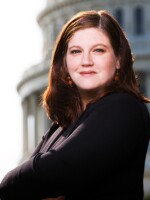Ohio Republican Rep. John Boehner takes up the gavel Wednesday to become the presiding officer of the House of Representatives -- the speaker of the House.
That puts Boehner after Vice President Joe Biden in the presidential line of succession. And it puts him in charge of the only body in government to be controlled by Republicans.
Boehner's mantra -- words you'll hear often in the coming year -- is "smaller, less costly and more accountable government."
Making Over The House
In the fall of 2008, after the Democrats took the White House and kept control of Congress, Republican leaders met with President-elect Barack Obama and discussed plans to work together on bipartisan solutions to the economic crisis, but Obama reminded the Republicans that the voters had spoken and that elections have consequences.
What a difference two years makes. When Speaker-designate Boehner met with Obama after the last election, he said he told the president: "I'll always be upfront with him, honest with him and fair. But I've also told the president: The American people have spoken. And it's time for Washington to listen."
Boehner's first priority is to reform the House itself. He has already changed the schedule, giving lawmakers more time in their districts; cut the number of slots on each committee, to make them leaner and more focused; and told chairmen to cut 5 percent from committee budgets. If the American people are making do with less, Boehner says, so should Congress.
And, beginning Wednesday, he says, "the agenda of this House will be the agenda of the American people. The people's priorities will be our priorities."
Boehner says he wants to make the House a kind of outpost for the people's priorities, inside the belly of the beast -- Washington. This idea fits right in with Republicans' eternal campaign against Washington, and the problem of continuing to style themselves as outsiders after they take control.
Outlining Priorities
Last September, as the election neared, Boehner and other Republican leaders gathered staff and media at a lumber warehouse outside Washington, D.C., to release their "Pledge to America" -- an outline of their priorities. Boehner called it "a new governing agenda, built by listening to the American people, that offers a new way forward."
The main points? Repeal the health care law, cut taxes and cut government spending.
"We don't underestimate how difficult this is going to be, given the economic circumstances that we face," Boehner said. "But it's our pledge and our commitment to get ourselves on a path to balance the budget and to pay down the debt if we're going to save the future for our kids and our grandkids."
Holding The Party Together
Boehner grew up in a family with 12 kids. His father owned a bar. And he likes to say, "All the skills I learned growing up are the skills I need to do my job."
Boehner says in such a large family, he had to learn to get along, to do things together. And working in his dad's bar taught him a lot, too -- about hard work and people.
"I mopped floors; I cleaned dishes; I waited tables; I tended bar," he said. "You have to learn to deal with every character that walks in the door."
On Wednesday, a lot of new characters are walking in the door of the Capitol. More than 80 of them are newly elected Republicans. Many of them have support from the Tea Party movement. Republican ranks now span the political range from social moderates to conservative libertarians.
So Boehner will have two big challenges -- leading the House in a time of divided government and serious economic problems, and, perhaps the more difficult test of his leadership, holding a broader Republican party together over the next two years.
Copyright 2022 NPR. To see more, visit https://www.npr.org. 9(MDAzMjM2NDYzMDEyMzc1Njk5NjAxNzY3OQ001))







